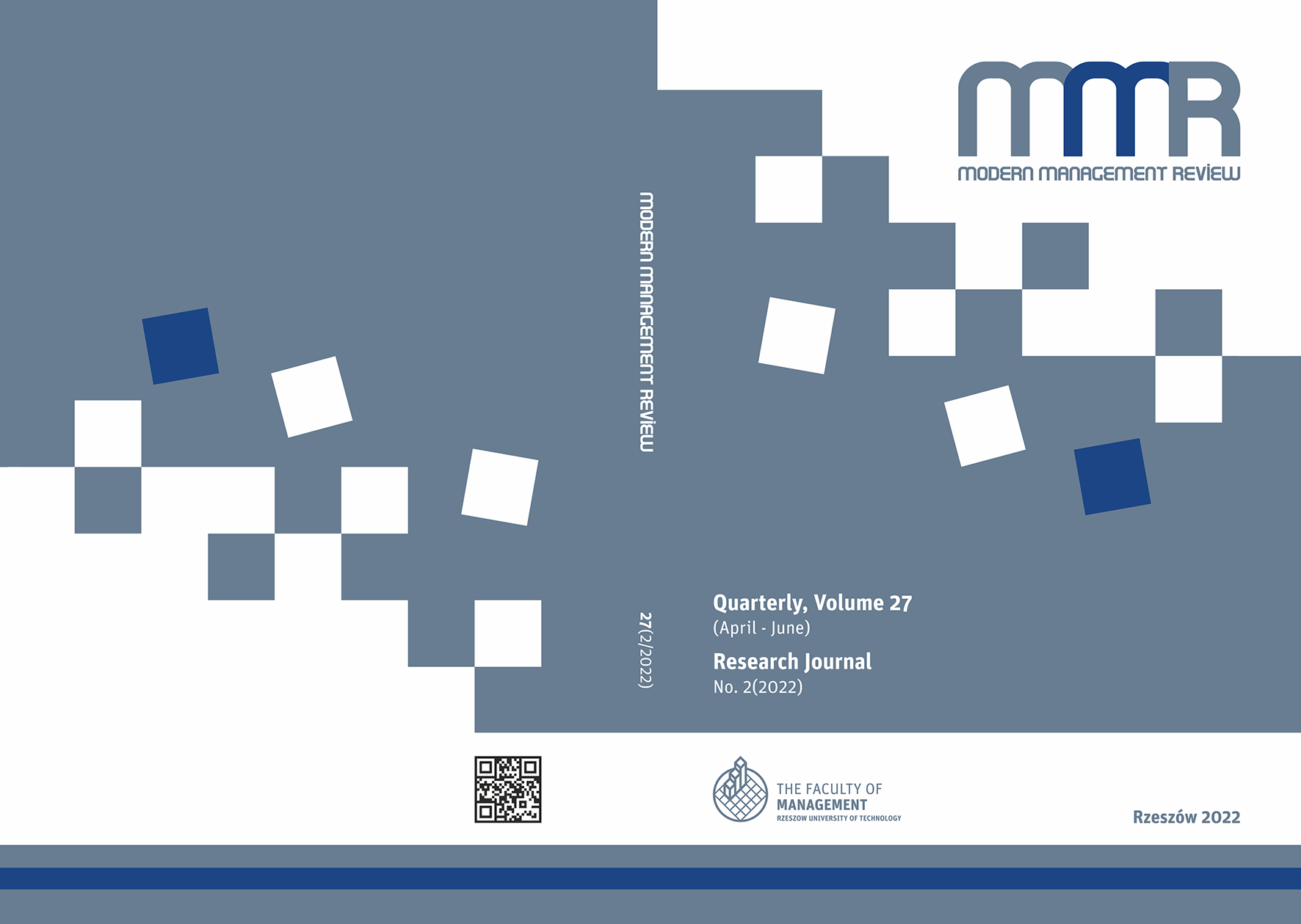Abstract
The main purpose of this paper is to examine the impact of entrepreneurial self-efficacy (ESE) as one of the dimensions of entrepreneurial spirit on the performance of Small Enterprises (PSEs) in Skikda, Algeria. Based on a self-administered survey questionnaire, data were collected from a random sample of 136 small enterprises (owners) in Skikda. The study adopted both descriptive and regression analyses to estimate the impact of entrepreneurial self-efficacy. Collected data were analyzed using the Statistical Package for Social Sciences (SPSS 23). The findings demonstrate that self-efficacy significantly affects the performance of small enterprises in Skikda. Where 27.7% of changes in the level of small business performance are the result of changes in entrepreneurial self-efficacy, which is considered a mediocre effect, which can be explained by the presence of other factors affecting the performance of these enterprises. However, the presence of this positive impact calls for focusing on raising the self-efficacy of Algerian entrepreneurs.
References
AKEKE, N. I., ADETAYO, H. O., AKEKE, A. R., & OYEBANJI, M. O. (2021). STRATEGIC LEADERSHIP AND PERFORMANCE OF SMALL AND MEDIUM ENTERPRISES: THE ROLE OF STRATEGIC INTERVENTIONS. Modern Management Review, 26(3), 7-15.
Algerian Official journal, (2001), Law No. 01-18 containing the directive law for the promo-tion of small and medium-sized enterprises, No. 77, December 12. (in Arabic)
Ayoub, M. (2017). The Role of Entrepreneurial Orientation in SME Entreprises Success Study of A Sample of Small and Medium Enterprises in Skikda-Algeria. An-Najah University Journal for Research-B (Humanities), 31(11), 5.
Bandura, A. (1977). Self-efficacy: toward a unifying theory of behavioral change. Psycho-logical review, 84(2), 191.
Bandura, A. (1993). Perceived self-efficacy in cognitive development and functioning. Educational psychologist, 28(2), 117-148.
Baron, R. A., Markman, G. D., & Hirsa, A. (2001). Perceptions of women and men as entrepreneurs: evidence for differential effects of attributional augmenting. Journal of Applied psychology, 86(5), 923.
Boyd, N. G., & Vozikis, G. S. (1994). The influence of self-efficacy on the development of entrepreneurial intentions and actions. Entrepreneurship theory and practice, 18(4), 63-77.
Christian, B. (1993). Business creation: epistemological contributions and modeling. Doctoral thesis in management sciences. Business administration. University of pierre Men-dès.Grenoble II. France.
Klongthong, W., Thavorn, J., Thanabodypath, W., Dhammathattariya, P., & Chandrachai, A. (2020). The influence of entrepreneurial self-efficacy and innovation on firm performance: Evidence from Thai startup firms. Humanities and Social Sciences Letters, 8(4), 450-463.
Krueger Jr, N. F., & Brazeal, D. V. (1994). Entrepreneurial potential and potential entrepre-neurs. Entrepreneurship theory and practice, 18(3), 91-104.
Levander, A. N. N. A., & Raccuia, I. S. A. B. E. L. L. A. (2001). Entrepreneurial Profiling. A Cognitive Approach to Entrepreneurship. Stockholm, Stockholm Business School.
Maitlo, Q., Pacho, F. T., Liu, J., Bhutto, T. A., & Xuhui, W. (2020). The role of entrepreneurial self-efficacy in resources acquisition in a new venture: the mediating role of effectuation. SAGE Open, 10(4), 2158244020963571.
Mesikh, Ayoub. (2017). the role of the entrepreneurial spirit in the sustainability of small and medium enterprises: Study of a sample of small and medium enterprises (entrepreneurs) in the state of Skikda, PhD thesis, Université du 20 Août 1955. (in Arabic)
Messikh, A . (2018). " Le phénomène entrepreneurial :Un phénomène multidimensionnel . Editions universitaires européennes, Republic of Moldova.
Messikh, A. (2021). The Entrepreneurial Intention of Algerian Women (a Sample Study of Skikda University Female Students). JWEE, (3-4), 134-150.
Newman, A., Obschonka, M., Schwarz, S., Cohen, M., & Nielsen, I. (2019). Entrepreneurial self-efficacy: A systematic review of the literature on its theoretical foundations, measurement, antecedents, and outcomes, and an agenda for future research. Journal of vocational behavior, 110, 403-419.
Oladimeji, M. S., Sofoluwe, N. A., & Odunaya, H. A. (2021). MACROECONOMIC BUSINESS ENVIRONMENT AND THE DEVELOPMENT OF SMALL AND MEDIUM ENTERPRISES IN NIGERIA. Modern Management Review, 26(4), 93-105.
Shen, Y., Wang, Q., Hua, D., & Zhang, Z. (2021). Entrepreneurial learning, self-efficacy, and firm performance: exploring moderating effect of entrepreneurial orientation. Frontiers in psychology, 12.
Srimulyani, V. A., & Hermanto, Y. B. (2022). Impact of Entrepreneurial Self-Efficacy and Entrepreneurial Motivation on Micro and Small Business Success for Food and Beverage Sector in East Java, Indonesia. Economies, 10(1), 10.
Zubair, D. S. S., & Khan, M. (2021). Entrepreneurial self-efficacy and small business perfor-mance in Pakistan. Management Science Letters, 11(6), 1715-1724.

This work is licensed under a Creative Commons Attribution-NonCommercial-NoDerivatives 4.0 International License.
Copyright (c) 2022 Modern Management Review

